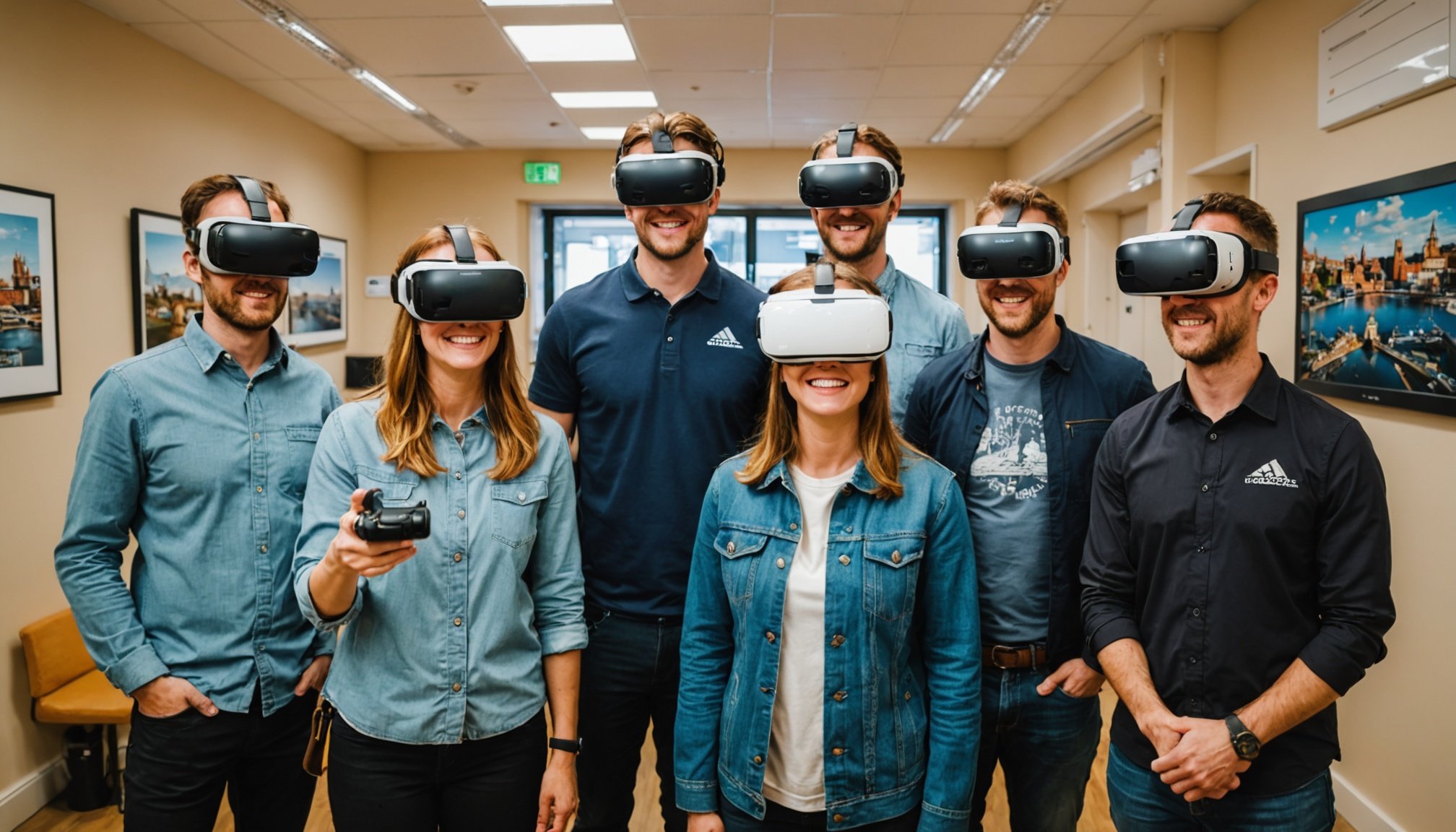Overview of Nottingham’s Innovative Travel Agency
Nottingham’s travel agency is a forward-thinking company, founded to revolutionise how travellers plan and enjoy their journeys. Their mission is to enhance travel experiences through technology, providing solutions that set them apart in the competitive industry. By integrating technology into their services, the agency has consistently prioritized delivering innovative travel solutions.
The importance of innovation in the travel industry cannot be overstated. With technology advancing rapidly, agencies must constantly adapt to remain relevant and effective. Nottingham’s agency exemplifies this adaptability, employing cutting-edge strategies to improve user experiences. This focus includes deploying tools such as virtual reality and augmented reality to offer clients immersive travel experiences before and during their trips.
Have you seen this : Unlocking Insights: Leveraging Data Visualization for Groundbreaking Research at an Oxford Institute
Travelers today demand more personalised and engaging travel planning. As such, this agency ensures its offerings are not only thorough but also technologically savvy. By adopting these innovative approaches, Nottingham’s travel agency not only retains its client base but expands it, cultivating a sense of wonder and excitement in each journey planned. Through such dedication to technological advancements, they clearly exemplify the future of modern travel solutions.
Understanding Virtual Reality Technology in Tourism
Virtual reality technology is redefining how we perceive travel. At its core, virtual reality (VR) immerses users in a digital environment using headsets and motion tracking, creating a lifelike experience that engages the senses. This technology has been embraced by the tourism sector, providing a transformative tool to simulate destinations and attractions.
In the realm of tourism, VR allows potential travelers to explore locations without leaving their homes. This means visiting historical landmarks, natural wonders, or immersive cultural sites virtually. The applications of VR technology are extensive, offering users the chance to make more informed travel decisions by previewing destinations.
Comparing VR experiences to traditional travel planning shows a significant evolution in the approach to travel. Traditional methods involve brochures and online images, which can often leave much to the imagination. Conversely, VR provides a rich, sensory preview that enhances one’s understanding of what to expect, bridging the gap between imagination and reality.
By integrating virtual reality tourism, Nottingham’s agency ensures that their clients experience a revolutionized form of exploration. This not only caters to tech-savvy clients but also provides an opportunity for those hesitant about travel to gain confidence through vivid, first-hand virtual tours.
Benefits of Virtual Reality Tours for Travelers
Virtual reality (VR) travel presents numerous benefits for those seeking rich, immersive travel experiences. One of the most significant advantages is the enhanced realism it offers. VR technology recreates detailed environments, allowing travellers to encounter destinations as if they were physically present. This form of immersive travel binds together the sights, sounds, and even the atmosphere of a location, offering a true-to-life preview.
Moreover, VR tours allow pre-travel exploration. By virtually visiting potential destinations, travellers make informed decisions regarding their itineraries. This ability to explore before committing to a trip results in greater satisfaction and fewer travel mishaps. It’s a transformative tool in ensuring a well-planned travel experience.
Financially, cost savings emerge as VR eliminates the need for initial exploratory visits. Travellers can navigate destinations and accommodations virtually, thus optimizing their travel budgets. Additionally, VR enhances accessibility by connecting individuals unable to travel for health or financial reasons with faraway locales.
The benefits of VR travel extend beyond simple convenience. They provide richer, informed, and economically sound travel planning, reshaping how people view and participate in global exploration. Virtual reality tours truly signify a leap towards more conscientious and inclusive travel.
Highlighted Virtual Reality Tours Offered by the Agency
Nottingham’s travel agency offers virtual reality tours that redefine traditional travel experiences. These tours cater to diverse interests and showcase the potential of VR technology in enhancing travel planning.
Tour 1: Historical Nottingham
Experience Nottingham’s rich past through a historical VR journey. This tour vividly portrays significant landmarks and events, offering users a deep dive into the city’s heritage. Unique elements, such as interactive narratives, elevate this tour, allowing individuals to engage with history dynamically. The user feedback highlights the educational value and fascinating insights gained.
Tour 2: Natural Landmarks Exploration
Venture into Nottingham’s stunning natural beauty from the comfort of home. This VR tour transports users to exquisite landscapes, showcasing the region’s geographical marvels. It provides an engaging way to appreciate nature’s splendour, with viewers often noting the breathtaking precision of the visual details as a highlight of the experience.
Tour 3: Cultural Experiences through VR
Discover Nottingham’s vibrant culture with an immersive VR tour. This experience encapsulates local festivals, arts, and culinary delights, offering a taste of the city’s lively atmosphere. Participants have praised the sensory richness and cultural authenticity, often remarking on the sense of connection it fosters with Nottingham’s diverse cultural tapestry.
Impact of Virtual Reality on the Travel Industry
The travel industry trends continue to evolve with the rapid integration of advanced technologies, especially virtual reality (VR). VR’s impact on tourism is profound, transforming how destinations and experiences are marketed and consumed. Current trends showcase VR’s role in offering travellers realistic previews, which significantly influence booking decisions by narrowing the gap between expectations and actual experiences.
The long-term potential of VR in reshaping travel experiences is vast. By delivering unprecedented levels of immersion, VR can forge new paths in tourism, allowing individuals to explore the world from their living rooms. This could democratise global travel, making experiences accessible regardless of geographical or financial constraints.
However, like any emergent technology, VR faces challenges within the industry. Technical limitations such as the cost of VR equipment and the need for constant technological updates can be barriers. Additionally, achieving high-quality, photorealistic environments that meet user expectations remains a hurdle.
Despite these challenges, organisations like Nottingham’s travel agency illustrate VR’s transformative nature, proposing solutions and setting technological standards. As VR technology evolves, it will likely revolutionise tourism, pushing the boundaries of how we conceive and experience travel.
Future of Virtual Reality in Travel
As technology advances, the future of travel technology is set to transform how we explore the world. Virtual reality (VR) will play a pivotal role in this tech-driven evolution, enriching the traveler’s journey. Since VR already enables immersive experiences, its continued development will likely introduce even more engaging applications that surprise and delight users.
Emerging technologies destined to complement VR include augmented reality (AR), artificial intelligence, and machine learning solutions. These innovations hold potential to refine travel experiences further, offering personalisation and interactive enhancements like never before. Expect AR features to blend real-world environments with digital overlays, enhancing both travel planning and on-site experiences.
For the travel industry, embracing these innovative trends is imperative. Industry players should invest in these novel technologies, ensuring they offer state-of-the-art experiences. Travelers, on the other hand, should actively engage with these advancements, staying informed about cutting-edge tools to maximise their future travel experiences.
As travel technology evolves, a collective commitment to innovation will redefine exploration and connectivity on a global scale, creating a future where the wonders of the world are universally accessible.











